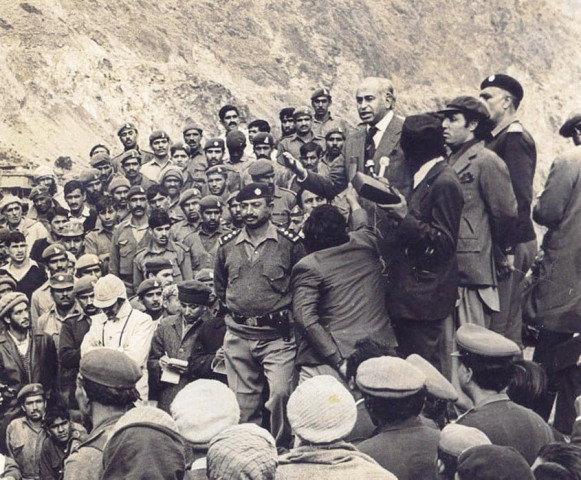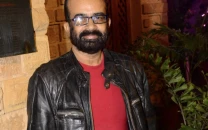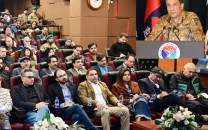Political musings: External, internal factors led to fall of ZAB - II
Sherpao claims some ministers in ZAB’s cabinet became part of the international conspiracy to oust him

Former prime minister Zulfikar Ali Bhutto
PHOTO: PID/FILE
In Part-I former PPP ideologue Aftab Ahmed Khan Sherpao, who now heads the Qaumi Wattan Party, listed the external factors that had led to the fall of Zulfikar Ali Bhutto (ZAB) and his subsequent hanging. In Part-II, he speaks about the internal factors that hastened the end of one of the most popular and charismatic democratic leaders in Pakistan.
Sherpao claims some ministers in ZAB’s cabinet became part of the international conspiracy to oust him. To substantiate his claim, Sherpao says the then US secretary of state, Henry Kissinger, had purportedly warned ZAB to roll back Pakistan’s nuclear programme or face dire consequences. “ZAB ignored the warning in greater national interests.”
Real power deals of Pakistani politics
According to Sherpao, many PPP ideologues were disillusioned by ZAB’s narcissism. And some new entrants in the party found favours with him during his term as prime minister. They somehow convinced ZAB to call elections earlier than scheduled. Analysts believe the idea was to surprise opposition parties and deny them time to prepare for the elections.
However, ZAB and his aides were surprised that the opposition parties quickly cobbled together a nine-party Pakistan National Alliance (PNA) to challenge the PPP. ZAB wanted to come to power again. And he hedged his bets on feudal lords and political heavyweights in stark contrast to his party’s socialist manifesto.
“Before the elections he [ZAB] had sought from deputy commissioners lists of ‘winning horses’ in their respective districts. Every ‘who is who’ of politics became part of the PPP. The party had contested the 1970 elections on the basis of ideology. Political novices were fielded by the party and they won,” says Sherpao. Whatever ideologues were left in the party resisted the new trend, but ZAB prevailed in the end.
However, Sherpao believes the 1977 elections were by and large fair. “If some anomalies happened, like in some constituencies in Punjab, those were acts of individuals. There was no organised rigging, not at all,” says Sherpao. The opposition agitated the results saying the elections were massively rigged. Unopposed election of many PPP leaders, including Sindh chief minister Mumtaz Bhutto, NWFP chief minister Nasruallah Khattak and ZAB himself lent credence to such claims.
“Now some [people] say ZAB wanted to get two-thirds majority in parliament. Rigging in few constituencies aside, the PPP was poised to secure majority,” says the veteran politician.
Initially, ZAB took PNA’s street agitation lightly, believing that it would fizzle out. ZAB realised the gravity of the situation when some army brigadiers refused to accept his orders and impose martial law in Lahore. Subsequently, ZAB entered into negotiations with the PNA leaders. “Gen Ziaul Haq [the then army chief] used to attend all the meetings where PPP’s negotiating team briefed the party leadership on the updates of their talks with the PNA,” recalls Sherpao. Why did Gen Zia attend these meetings? “ZAB asked Zia to sit in these meetings because there were certain sticking points. Like one of PNA’s demands was calling off the military operation and withdrawing troops from Balochistan. Zia shot down the demand,” says Sharpao.
Political musings: Real power deals of Pakistani politics—I
He claims that ZAB and PNA had reached an agreement on all contentious issues. “The two sides were discussing the nitty-gritty when Zia imposed martial law.”
What was the agreement?
“Both sides agreed on fresh polls for national and provincial assemblies. Almost everything was settled when Ziaul Haq imposed martial law.” Sherpao recalls the July 5, 1977 event, codenamed ‘Operation Fair-play’ that led to the third coup in Pakistan’s chequered political history.

What triggered Gen Zia’s move? “Naturally, you can assess yourself how the conspiracy started, where it led and how far all this went,” says Sherpao.
After the declaration of martial law, ZAB was briefly detained. After he was released, ZAB garnered public support through meetings which dimmed the hopes of Gen Zia, who was made to believe that once out of power the PPP leader would lose all the popularity. “When the military authorities saw his popularity was increasing, it became a matter of concern. The PNA leadership told Gen Zia that unless ZAB was sidelined, this phenomenon won’t stop,” says Sherpao.
Subsequently, ZAB was implicated in a murder case that ultimately led to his execution despite mercy pleas from different friendly states. “The meeting between ZAB and Zia in Murree had not ended on a positive note. Bhutto Sahab was just ousted from power and he had all that arrogance. At that time, Ziaul Haq decided, ‘if I spared him, he would not spare me’,” Sherpao says.
Power politics in the Middle East
Another factor that contributed to the end of ZAB was his politics of ‘vendetta’ that had turned all political rivals into his enemies. “All political parties were full of venom against ZAB. Be it Asghar Khan, Wali Khan, Mufti Mehmood, Zahoor Elahi… everyone had suffered at the hands of ZAB. It is also a fact that Bhutto had this politics of vendetta in him,” says Sherpao.
The misuse of a formidable 15,000- member Federal Security Force (FSF) against political rivals also played a major role in his ultimate fall. “Increasingly suspicious of those around him, and to thwart any possible coup, ZAB as the prime minister had formed the FSF for his personal security – the force was, however, later he used against his political opponents.”
Published in The Express Tribune, October 26th, 2015.


















COMMENTS
Comments are moderated and generally will be posted if they are on-topic and not abusive.
For more information, please see our Comments FAQ